Author: John B. Stephens
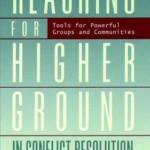
Reaching for Higher Ground in Conflict Resolution: Tools for Powerful Groups and Communities
A hands-on manual for learning the leadership skills that take you beyond compromise to higher ground. In this visionary book, the authors present their challenging, innovative and principled approach to problem solving within groups. Reaching for Higher Ground is filled with the practical information and illustrative examples that group leaders and conflict resolution leaders would need to achieve extraordinary outcomes with any group.
Cite as:
Dukes, E., Piscolish, M. and Stephens, J. (2000). Reaching for Higher Ground in Conflict Resolution: Tools for Powerful Groups and Communities. San Francisco, Calif.: Jossey-Bass.
…
Continued
Teaching Collaborative Governance: Phases, Competencies, and Case-Based Learning
Collaborative governance is becoming a primary motif in public administration research and practice. There is widespread recognition of the need to develop leaders for collaborative governance, yet clear guidelines or standard operating procedures are elusive. However, while the literature is varied, a broad model of collaboration phases is distinguishable and core competencies are emerging. This article outlines a four-phase model of collaborative governance and corresponding competencies to help ground education and training for collaborative governance. The application of this approach to case teaching is demonstrated by repurposing a readily available teaching case.
Cite as:
…
Continued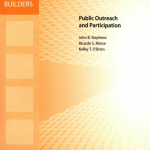
Public Outreach and Participation
Although city and county elected officials frequently hear from their constituents, officials and citizens often do not fully understand how public participation occurs and how it informs decision making by municipal and county boards.
This book, part of the Local Government Board Builders series, offers ideas for engaging the public, assesses the strengths and weaknesses of a variety of participation mechanisms, and provides guidance for better public outreach. It also discusses ways of developing long-term community participation.
See the Local Government Board Builders Series webpage for other books in the series and related School of Government publications.
Cite as:
Stephens, J., Morse, R. and O’Brien, K. (2011). Public Outreach and Participation. [Chapel Hill, N.C.]: UNC School of Government.
…
Continued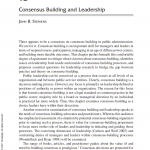
Consensus Building and Leadership
There appears to be a consensus on consensus building in public administration: We are for it. Consensus building is an important skill for managers and leaders in terms of responsiveness, participation, managing in an age of diffuse power centers, and building more durable outcomes. This chapter pushes beneath this comfortable degree of agreement to critique what is known about consensus building, identifies issues on leadership from inside and outside of consensus-building processes, and proposes essential questions for leadership research to bridge the gap between practice and theory on consensus building.
Cite as:
Morse, Ricardo S., et al. Transforming Public Leadership for the 21st Century, Routledge, 2007. ProQuest Ebook Central, http://ebookcentral.proquest.com/lib/unc/detail.action?docID=1899942.
Created from unc on 2019-04-02 09:46:23.
…
Continued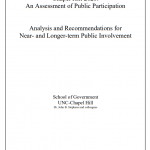
Chapel Hill 2020: An Assessment of Public Participation — Analysis and Recommendations for Near- and Longer-term Public Involvement
In 2011-12, the Town of Chapel Hill tried something big: using the goal of updating the town’s
comprehensive plan to experiment with a wide range of public information and engagement
methods. The goal was “to touch 10,000 people” in this community of about 55,000 permanent
residents.
In order to learn from the Chapel Hill 2020 (CH2020) initiative, selected public participation and
staff roles are evaluated. This formative evaluation provides:
a) Summary feedback from key participants and stakeholders
b) Recommendations for concerned residents, civic leaders, and town government elected
officials and staff on near-term and longer-term public involvement strategy and tools.
Cite as:
Chapel Hill 2020: An Assessment of Public Participation — Analysis and Recommendations for Near- and Longer-term Public Involvement. http://www.townofchapelhill.org/Modules/ShowDocument.aspx?documentid=15998 , Pages: 62
…
Continued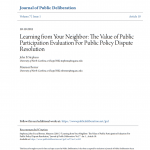
Learning from Your Neighbor: The Value of Public Participation Evaluation For Public Policy Dispute Resolution
Public policy dispute resolution [PPDR] and public participation [PP] are closely related fields of
practice. Despite many similarities, we identify gaps in most evaluation studies conducted in the two
fields. Evaluators of PPDR can better draw upon PP evaluations.
The values, concepts, objectives, and practices of PP and PPDR are compared for similarities and
differences. Focusing on the last 15 years, PPDR and PP evaluation literature is analyzed, with attention
to four PP evaluation studies of special relevance to PPDR. Five ways that PPDR evaluation can be
improved by drawing on PP evaluation studies are identified. Two promising works that begin to bridge
the PPDR-PP evaluation gap are summarized.
Cite as:
John B. Stephens and Berner, M. (2011). “Learning from Your Neighbor: The Value of Public Participation Evaluation for Public Policy Dispute Resolution,” Journal of Public Deliberation. 22 pages.
…
Continued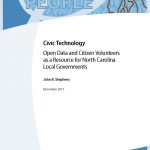
Civic Technology: Open Data and Citizen Volunteers as a Resource for North Carolina Local Governments.
Civic technology is an emergent area of practice where IT experts and citizens without specialized IT skills volunteer their time using government-provided open data to improve government services or otherwise create public benefit. Civic tech, as it is often referred to, draws on longer-standing practices, particularly e-government and civic engagement. It is also a new form of citizen–government co-production, building on the trend of greater government transparency.
Cite as:
Stephens, J.(2017). Civic Technology: Open Data and Citizen Volunteers as a Resource for North Carolina Local Governments. Report, School of Government.
…
Continued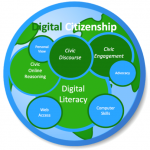
Beyond the Echo Chamber: Pedagogical Tools for Civic Engagement Discourse and Reflection
How can educators leverage blogs and other social media spaces to encourage a reflective, critical discourse about civic engagement that fosters a true learning exchange over promoting one’s own ideas? This article reports upon a single case study of the “Community Engagement Learning Exchange,” a multi-author blog on civic engagement. Through qualitative content analysis and expert interviews with the blogger community we explored the interaction of digital citizenship and civic online discourse, in order to map out civic engagement pedagogies that make use of blogs or other shared writing / media tools. The content analysis of blog posts indicates that high verbosity scores for factual orientation, personalization and interactivity correlate with broader reach. The interview material was condensed into concept maps that identified specific themes for digital citizenship (inevitable, easy, transparent, technologically diverse and changing, unequal, divisive, difficult, superficial) and civic engagement pedagogies (content, format, authenticity, tone, listening, exemplary conduct, accountability, hope). Overall, in the community analyzed, ground rules and a shared writing style lead to discussions and learning processes that transcend differences in views, backgrounds and opinions. Further efforts to support and measure the right amount of friction that exemplifies diverse and even clashing opinions while keeping an online community together emerged from the case study as a future area of practice development for digital citizenship.
Cite As:
Panke, S. & Stephens, J. (2018). Beyond the Echo Chamber: Pedagogical Tools for Civic Engagement Discourse and Reflection. Educational Technology & Society, 21(1), 248 – 263
…
Continued
